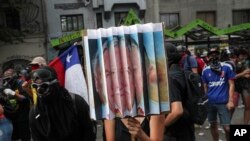Chile's president is struggling to bring calm as demonstrators took to the streets again Monday, a month into a potent protest movement that has dramatically altered the political landscape of the South American nation.
More protests erupted after President Sebastian Pinera acknowledged late Sunday that excessive force had been used to clamp down on demonstrators with legitimate social demands. He said abuses had been committed and promised ``no impunity'' for anyone who commits acts of violence.
Twenty-six people have died in protests that began last month over an increase in subway fares in Santiago, but mushroomed into wide-ranging complaints about much deeper issues of inequality. Thousands have been injured in clashes with police who fire pellet guns directly at faces, with at least 230 people losing sight in an eye.
On Monday, one group of protesters donned eyepatches and rallied outside Chile's supreme court.
Thousands of others gathered in a central plaza in Santiago carrying flags and signs demanding ``justice,'' better pensions and the resignation of Pinera, whose term ends in March 2022. The protest was peaceful until about 300 masked demonstrators began throwing rocks at police, who responded with tear gas and water cannons.
Paolo Abrao, executive secretary of the Inter-American Commission on Human Rights, added his voice to other human rights defenders who have raised the alarm about the level of force being used against protesters in Chile. He cited concerns about disproportionate use of force, care for victims and the pattern of injuries that has emerged.
Chileans are also calling for changes to the education system, health care and an overhaul of the constitution, which was written during the dictatorship of Gen. Augusto Pinochet. On Friday, officials announced an agreement charting a course to potentially rewrite the legal principles on which the country is based. A plebiscite to be held in April will ask Chileans if they want to change the constitution and who should draft it.
The agreement was supported by most political parties, although Pinera was absent during the signing Friday.
"We have all changed — because the social pact cracked, and made its wounds visible," Pinera said in his television address Sunday night.
Pinera, who was elected in 2017 in part due to his proposals for economic growth, has been forced to switch gears and focus on a package of modest social improvements aimed at calming the social unrest. Treasury minister Ignacio Briones recently announced weaker economic growth predictions and forecast that 300,000 jobs will be lost in the coming months.




